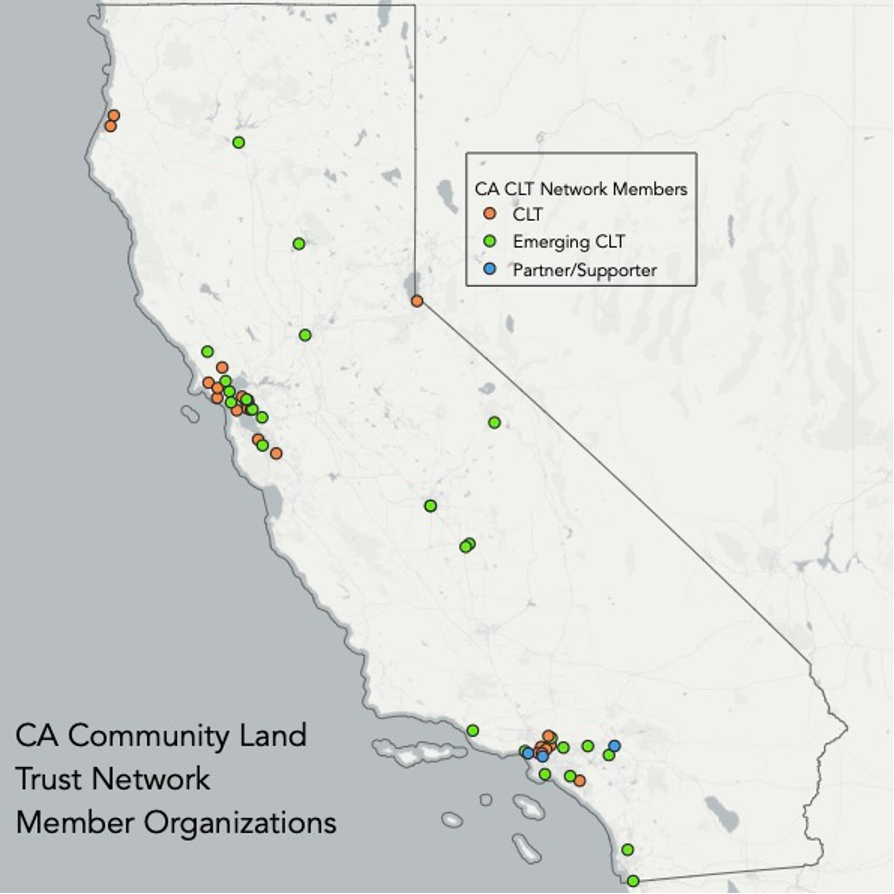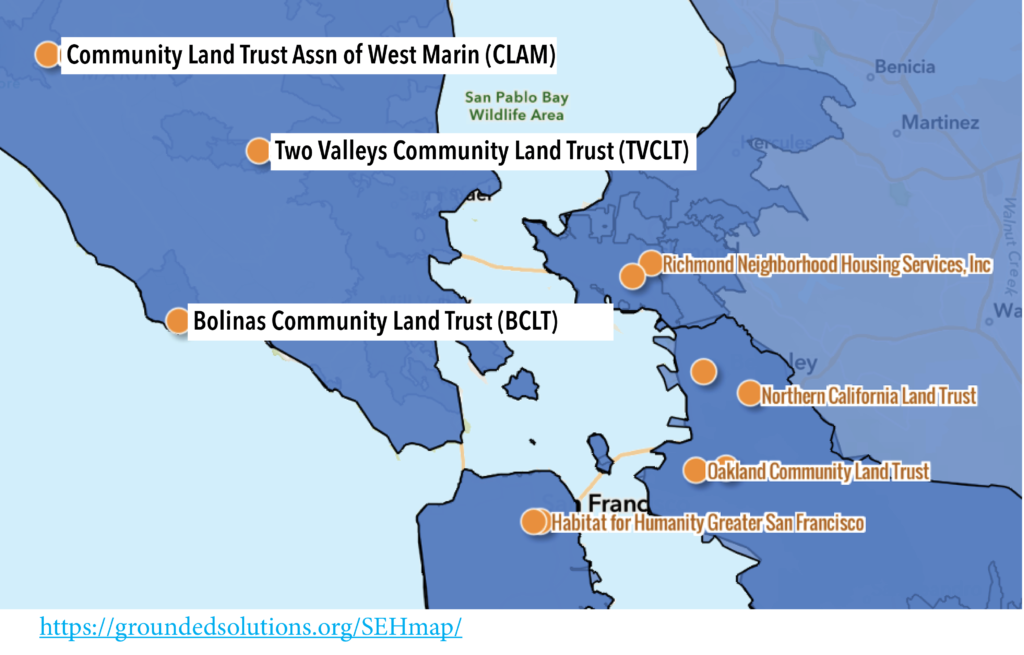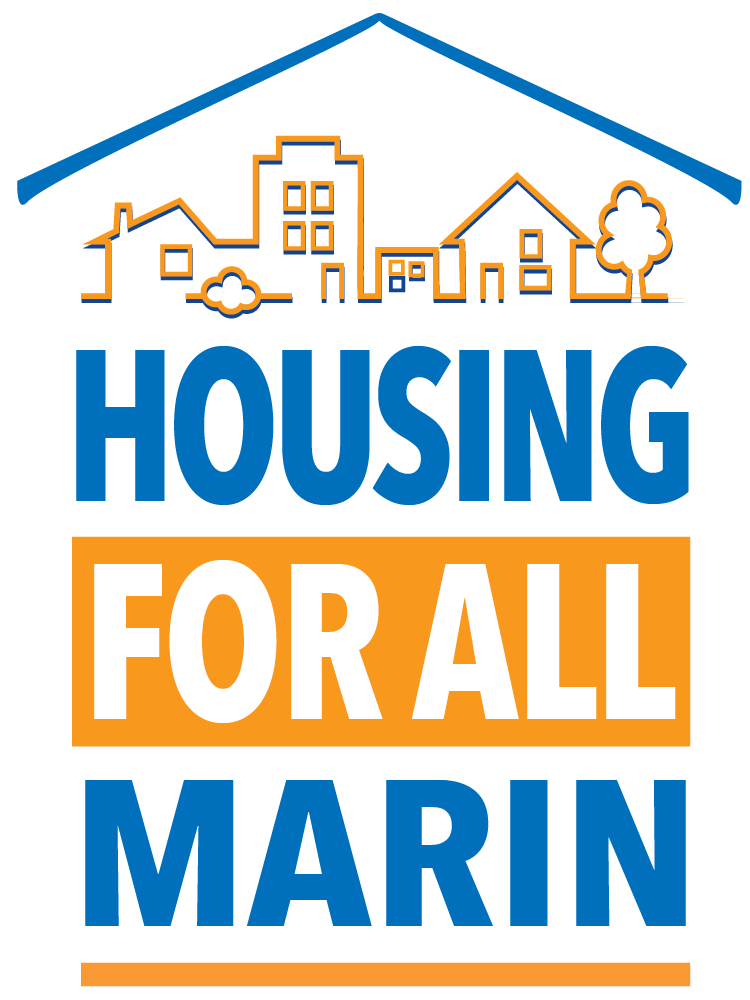Community Land Trusts
Community Land Trusts
Taking the cost of land out of the cost of housing, by Tom McCafferty, MEHC board member; Community Land Trust Association of West Marin (CLAM) Project Manager
Marin can ensure long-term affordability and enhance communities by utilizing the Community Land Trust model.
In an era of escalating home prices and stagnant wages, finding affordable housing and preserving community spaces has become increasingly difficult for many. In response to this dilemma, Community Land Trusts (CLTs) can serve as a valuable tool for establishing long-term affordability and enhancing communities. The potential benefits of CLTs in Marin County have not yet been fully realized.
One of the earliest examples of community land ownership in the United States is New Communities Inc., established outside of Atlanta, Georgia, in 1969. This organization’s origins can be traced back to the civil rights movement of the 1960s when activists sought to address racial and economic injustices in housing. The goal of New Communities was to put an end to the cycle of sharecropping and land loss experienced by Black farmers in the region. Through community organizing, they acquired thousands of acres of land and established a unique organization based on cooperative ownership, sustainable agriculture, and economic self-sufficiency. Despite experiencing systemic racism and financial challenges, New Communities thrived as hundreds of families collaborated to collectively enhance their lands and economic opportunities. Due to discriminatory US Department of Agriculture lending practices, New Communities was unable to survive the intense drought of the late 1980s. After winning $13 million in a lawsuit brought by Black farmers against the USDA (Pigford v. Glickman), New Communities purchased Resora, which was previously one of the largest slaveholder estates in Georgia. It is now a working farm and retreat center operating on the CLT model.

This schematic illustrates the community land trust model of home ownership. The CLT home rental scenario works much the same way: the CLT owns the land –often outright– and leases the dwelling unit without having to include the cost of the land in the price of the rental. In each case, “affordability in perpetuity” is the goal.
CLTs can offer rents and home sales substantially below market rates
CLTs are distinct from other models of land ownership and development because they focus on community ownership, long-term affordability, and democratic governance. These unique features offer a pathway toward more equitable and sustainable communities. Through a variety of models, including apartment and home rentals and sales, CLTs can offer rents and home sales substantially below market rates.
CLTs own the land and can lease or sell it at below-market rates to individuals or organizations who agree to use the land for affordable housing purposes. CLTs use a variety of mechanisms, such as ground leases and resale restrictions, to ensure that housing and other structures built on the land remain affordable. These mechanisms are crucial for empowering residents to have a direct say in decisions affecting their neighborhoods, including housing development and community-owned artist and retail spaces. In rapidly urbanizing or gentrifying communities, CLTs can safeguard against the loss of cultural heritage and identity. By preserving historic buildings, supporting local artists and cultural organizations, and promoting inclusive programming, CLTs help maintain the unique character and vitality of neighborhoods.

The California Community Land Trust Network (CACLTN) is a coalition of organizations dedicated to advancing the principles and practices of Community Land Trusts (CLTs) throughout the state.
CLTs provide a crucial solution for long-term affordability
Marin County, one of the wealthiest counties in California, has experienced rapid and ongoing increases in property values and housing costs, making it more and more challenging for low and moderate-income residents to afford to live in the area.
Additionally, the county’s natural beauty and proximity to urban centers have made it a desirable destination for second-home owners, further compounding the affordability crisis and contributing to the displacement of long-time residents. In this context, CLTs provide a crucial solution by offering a mechanism to preserve affordable housing, prevent speculative land grabs, and empower communities to shape their future.

In Marin County, we have the opportunity to enhance and broaden CLTs to empower local residents to work together to create housing options that are permanently affordable. By doing so, we can help safeguard vulnerable communities from displacement and encourage inclusive and sustainable development. This approach aims to benefit all residents, irrespective of income or background.
CLTs in Marin County acquire funding through rental and lease income, federal and state grants, donations, and public funding through the County in terms of grants and loans as well as public/private funding and financing through the Marin Housing Trust Fund and Measure W, a transient occupancy tax levied on short term rentals and hotel/motel stays in West Marin (the proceeds of which are split between emergency services and housing).
As for the current CLT projects in Marin County, CLAM is working towards the rehabilitation of 54 units of affordable housing at a former Coast Guard housing site in Point Reyes Station. In 2022, CLAM completed its “first retained life estate” agreement in the Age-In-Place program, a program in which you can sell or donate your residence to a land trust, and retain the rights for use for life. Donors receive an immediate income tax deduction. BCLT has recently been awarded more than $8 million dollars in grant funding to purchase Tacherra ranch and construct 27 new units of housing. TVCLT is working to expand in their service area of San Geronimo and Nicasio Valleys. The recently formed Mt. Tam Community Land Trust seeks to acquire its first project in the communities surrounding Mt. Tam.

Community Land Trust of West Marin (CLAM)
Bolinas Community Land Trust (BCLT)
Two Valleys Community Land Trust (TVCLT) formerly known as San Geronimo Valley Affordable Housing Association
Acquiring land is the biggest hurdle
One of the largest hurdles for these organizations is the difficulty in acquiring land. With over 75% of Marin County’s land area preserved as open space, parks and protected areas, integration of affordable housing development with existing conservation efforts could create a balance between environmental preservation and community housing needs.

Acquiring and financing land requires money. The Bay Area Housing Finance Authority (BAHFA) is an agency created to address affordable housing needs in the San Francisco Bay Area. This November, Bay area residents will vote on a $20 billion dollar Affordable Housing bond measure which could provide grants and loans that facilitate land acquisition, infrastructure development, and the construction or renovation of housing units. This support would enable land trusts and similar organizations throughout the Bay Area to expand their housing stock and fulfill their mission of providing affordable, community-controlled housing opportunities, and help preserve the quality of life and character of the place we call home.
MEHC has endorsed the Affordable Housing Bond Measure and urges all residents and employers to do so as well, here>> . For more information, go here >>
| RESOURCES |
| ARC OF JUSTICE: The Rise, Fall, and Rebirth of a Beloved Community (video) Watch the remarkable story of New Communities, Inc. (NCI), the inspiration for hundreds of community land trusts in the US and worldwide. Started in 1969 by Civil Rights Movement leaders in Georgia, NCI helped secure economic independence for African American families through access to land. Community Land Trust of West Marin (CLAM), Bolinas Community Land Trust , (BCLT)Two Valleys Community Land Trust (TVCLT) formerly known as San Geronimo Valley Affordable Housing Association, Mt. Tam Community Land TrustHope Housing Community Land Trust (HHCLT) |
| MEHC has staffed up with talented summer interns |
| These bright and committed staffers will support MEHC’s public education programs this summer, including outreach and advocacy for the Affordable Housing bond measure which will be on November’s ballot. |
 |
 |
| November ballot can bring stable funding source for affordable housing in Marin One significant barrier to the creation and preservation of affordable housing is funding. This year, an exciting opportunity can bring more affordable housing funding to Marin: a $20 billion Affordable Housing Bond will be on the November ballot. This bond will provide $700 million in affordable housing funding to be allocated by Marin, for Marin. No other funding source can make this level of funding available to our County. In order to educate the public and advocate for passage of the ballot measure, MEHC has joined with other Marin based organizations to create the Housing For All Marin/Casa Para Todos Marin Coalition. Coalition members include: Canal Alliance, Community Action Marin, Housing Crisis Action, Legal Aid of Marin, Marin Environmental Housing Collaborative, Marin Organizing Committee, North Bay Community Services, West Marin Community Services. We will be busy this summer, doing outreach and tabling at events, and meeting with groups to help educate the community on housing. Keep up to date by following our calendar or by signing up for our weekly Coming Up newsletter. If you’d like to subscribe, email us at info@marinmehc.org. If you or your organization would like to learn more about affordable housing or about this bond, please reach out to us at info@marinmehc.org. We will be happy to meet with you. |
| MEHC’s Perspective newsletter is a mostly-monthly publication with important housing related information pertinent to Marin County residents. Visit our website, the Housing Hub for up-to-date information! |
 MEHC works for the Marin community Many Marin workers, employers, residents and nonprofits support MEHC’s work to advance environmentally appropriate, culturally sensitive, and socially equitable affordable housing. If that includes you, please consider a tax-deductible donation to MEHC to help us keep working. Your support matters, thank you. |
